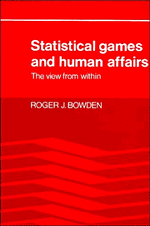Book contents
- Frontmatter
- Contents
- Preface
- 1 The reactive sample space
- 2 Response and social information
- 3 Response and strategic behavior
- 4 Publication and the political economy of prediction
- 5 Rational expectations and socioeconomic modeling
- 6 Games, beauty contests, and equilibrium: the foundations of structural invariance
- 7 Disequilibrium and noncooperative expectational games
- 8 The view from within
- References
- Index
1 - The reactive sample space
Published online by Cambridge University Press: 05 February 2012
- Frontmatter
- Contents
- Preface
- 1 The reactive sample space
- 2 Response and social information
- 3 Response and strategic behavior
- 4 Publication and the political economy of prediction
- 5 Rational expectations and socioeconomic modeling
- 6 Games, beauty contests, and equilibrium: the foundations of structural invariance
- 7 Disequilibrium and noncooperative expectational games
- 8 The view from within
- References
- Index
Summary
Ephphatha
If we were better at forecasting human affairs than we are, world fairs would never go bankrupt, political pollsters would never get egg on their faces, and the perennial snake-oil merchants of economic and financial forecasting would become only a curiosum of economic history. Although the consequences may be less dramatic than failures in prediction, inference in the economic sciences has been dogged by the disquieting shadow of indefiniteness and more recently by dispiriting claims of outright failure: After half a century of intensive effort we have learned from economic data less than what we might have expected and far less than what we should have liked. With respect to another discipline Whyte (1969) remarks that the eminent sociologist Louis Wirth “used to terrify Ph.D candidates by requiring them to name one proposition that has been reasonably well supported by research data,” a state of affairs that according to Phillips (1973) has not changed much in more recent times. In this book, we shall be concentrating on just one of a multitude of possible reasons why things have gone wrong. From the methodological point of view, however, we think that it is important. It may be summarized thus: In our adaptations of statistical methods from the natural or engineering sciences, we have tended to forget an important difference, namely, that our sample space is cognitive and that as statisticians we are cognate participants. Knowledge of human affairs is neither established nor disseminated in a vacuum.
- Type
- Chapter
- Information
- Statistical Games and Human AffairsThis View from Within, pp. 1 - 17Publisher: Cambridge University PressPrint publication year: 1989

